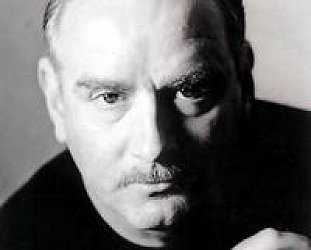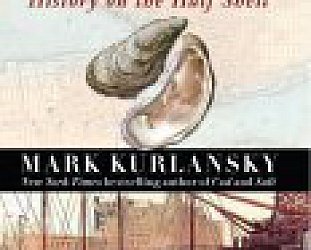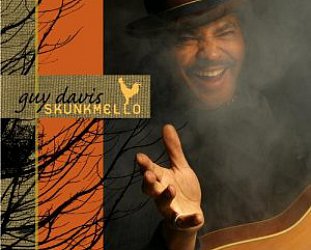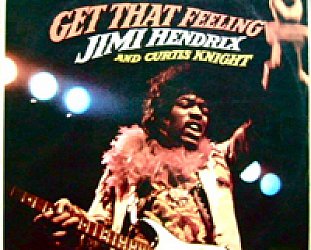Graham Reid | | 13 min read

Mark Kurlansky is the writer many others want to be: his career in journalism took him to Europe, China, the Caribbean and Middle East, and he lived for a time in Mexico City. His award-winning books are enormously popular despite addressing unusual subjects, notably the complex histories of cod, salt, and the Basques. He has also written an acclaimed novella, and has a column in Food and Wine magazine about the history of food (he was once a pastry-chef). Now has his debut novel out, the dense, witty and acutely observed Boogaloo on 2nd Avenue -- set in New York’s Lower East Side where he once lived -- and it is a lively ensemble of Hispanic, Italian and Jewish characters.
That brief career synopsis however doesn’t account for his book on Jewish communities in Europe today (The Chosen Few: The Resurrection of European Jewry) or articles in Harper’s, The New York Times, and the International Herald Tribune. Or his 1968: The Year That Rocked The World of two years ago about that gear-changing, revolutionary period.
And after the interview in his Upper West Side office opposite his home he casually mentions his next book is about oysters -- and the history of New York. (A review of that book follows this interview)
I guess at the moment you are in promotional mode for Boogaloo on 2nd Avenue?
To tell you the truth I’ve just gotten through with promoting the paperback of last year’s 1968 book, but by the time I get to New Zealand I will be in Boogaloo promo-mode. So I’m just starting up. 
Let me ask you about that then. Two years out from having finished writing that book [1968], how do you feel about having to re-address it when you have already finished something else?
Actually I love talking about 1968. It’s so much easier talking about non-fiction than fiction anyway. I sometimes think there is nothing really to be said about a novel but ‘read the book’. I have a jaundiced view of literary critics.
Is that having been on the receiving end?
Not at all, I just think of the great writers of my lifetime who have died like Hemingway, Steinbeck and Graham Greene and how after they died there was all of this analysis of their works that never seemed necessary at the time, you could just read their books.
That is much in the nature of life today, that everything is analysed in the extreme. I was watching some of the re-enactment of the Michael Jackson trial just before speaking to you and every sentence that was uttered in court seems to be analysed by a panel of three lawyers.
Oh yeah, and that’s also a result of too much airtime for television, and that is something that began in 1968 incidentally, the talking heads. It began with comment on [President Lyndon] Johnson’s state-of-the-union address. Before that everything was just put on TV and that was it.
Okay, because we are talking about 1968 -- and we’ll come back to Boogaloo in a few minutes -- let’s talk about the notion of the power of television at that time. As your book makes clear there was a rare convergence of idealism, dissent and technology in 1968.
Yeah, a combination of things that will never again come together in quite that way
Because today we are too tribal, we are separate tribes within a city, different countries and so on?
I’m not sure I agree with that. 1968 was the beginning of a shift to the kind of world we live in, a much more global and international world. What we’re doing right now most likely we would not have been doing in 1968. International phone calls? The hassle you would have had to go through with the international operator calling you back. It wouldn’t have been worth it.
And the internet hasn’t exactly bought people together, but has allowed more smaller voices of opinion to come though but no greater consensus.
Yeah, the internet is interesting right now. Like television in the 60s nobody has figured out how to control it and a lot of interesting things go on, although a lot of it nonsense. The potential for political organisations on the internet is fantastic.
Inasmuch as they can find their constituency out there?
Yeah.
Also what happened with Dan Rather, there are a lot of people out there with experience and expertise in many subjects which they can bring to bear very quickly, whereas they might not have had that opportunity or access to a medium to do that.
Sure. News media is descending to lower and lower levels, it’s good that there are other avenues although the quality of the internet can be dubious. I don’t do much research on the internet.
I’d like to ask you about how you do your research in a minute, but I’d like to get a little chronology first. You graduated in 1970 and I have seen somewhere that you were once a chef and pastry-maker, but of course you were a longtime journalist. Which came first?
This is how it works. I was a theatre major and started off as a playwright, but where most people in theatre when they are young wait on tables I thought it would be more interesting to cook, and that’s when I became a pastry-maker. I got disenchanted, not with pastry-making but theatre, and decided to move on to journalism.
How do you move from pastry-maker to become a foreign correspondent, because some people would work all their lives in a newspaper and never be sent overseas. Were you just young and silly enough to say I’ll do that?
Exactly.
Editors like people like that.
They do. Sometimes it works better than other times. I’d say, ‘I’m gonna go to Spain and cover this Franco dictatorship because the government’s going to be overthrown’ and they bought that idea. So I went there, and there was actually nothing happening at all. But then he died.
A good career move for you. There is a big Hispanic population in America, but mostly from Southern and Central America, so I wouldn’t have thought a newspaper editor wouldn’t buy into a journalist going to Spain. It’s a country that doesn’t often register in American newspapers.
No, but the beauty of it was that nobody had reported on Spain and Franco in years. So that was one of three or four standard sales pitches that you can use: one is ‘What’s going on there? No one has really taken a look in while’.
And that’s how you got to the Caribbean as well?
I was based in Mexico and was covering Mexico and Latin America and the wars in Central America, and I wasn’t much into it. But I met someone from the Chicago Tribune who was based in Mexico City who was assigned to cover Mexico, Central America, South America and the Caribbean, which was overwhelming. So we hatched this plot for me to become the Caribbean correspondent and that worked out great, but they never replaced me when I left.
What years were you doing the Caribbean?
I guess it was 84 to the early 90s.
Some volatile things were happening in Jamaica and Haiti.
Oh yeah, Haiti is always very volatile but at the time people thought there were going to be significant changes. I actually didn’t, but one thing I learned in newspaper writing is you never file a story about how nothing is going to happen here. It always does.
You were filing feature stories and news reports?
Yes, both.
It seems to be a feature writer you have to have a bit of the novelist about you in that the way to propel a longer story is through character. Is that what got you into writing books? That you had all this acquired information which needed to get out?
I found newspapers to be very frustrating and confining in the sense you didn’t have much space but also that you couldn’t go into much depth, and also there were many things you couldn’t investigate because you had this pressure to file a story by 11pm and you couldn’t afford to chase after things which might not turn up anything. So my first book was on the Caribbean and it was all those things I couldn’t do for a newspaper.
Tell me about Cod. If I was an editor I’d be thinking, ‘a book on cod, for God’s sake?’
It was kind of an easy pitch because it just happened to get pitched to the right person almost immediately and wasn’t something I shopped around a lot. I actually originally conceived it as a book for a British publisher, a small British publisher who will remain nameless, asked me if I had an idea for a small book for the British public and I came up with this idea. Then I mentioned it to Nancy Miller my editor who has now edited something like 12 books of mine, and she thought it was a great idea and mentioned to the publisher at Walker’s George Gibson and he bought it immediately. The poor British guy was still humming and hawing over the money.
They bought it because they knew of your background, and had you been writing food columns at that time?
I don’t know. I think they just got the idea that this was a remarkable story and I had done two books before.
It comes with an extensive bibliography and references, do you do all your own research?
I do. I have this fantasy of farming it out but I get all of my best ideas while I’m doing it so I can’t really afford to let other people do it.
And in a book like Cod you had the arc of the story in your head.
Yeah. What most appealed to me was the story of 1000 years of fishing and all of the key roles it played in history and all these firsts, the first frozen food, and then it becomes the first really dramatic case of over-fishing and the near-extinction of this most common and plentiful fish and how that opened people’s eyes to over-fishing.
You mention orange-roughie in the book. I remember those two or three years when everyone here was eating it and then suddenly it was all gone.
Oh, that’s an amazing story.
I guess Basque grew out of Cod?
Yes, but in a funny way. I was interested in the Basques long before I was interested in cod. I’d spent a lot of time in Basque country but I could never really imagine anyone was going to buy a book on the Basques. Then what happened there was a lot about the Basques in the cod book and it seemed to me it was the most popular part of the book. It was what reviewers mentioned, what people asked about when I gave talks, and people most noticed the Basques in the book.
So the publisher of the cod book asked if I’d be interested in doing a book about the Basques. I’d dreamed for someone to ask me that.
So you immersed yourself in that culture.
I had spent lots of time there but I rented a house right on the French-Spanish border and a central location and spent time investigating things I had never gotten to do for a newspaper.
And people were happy to talk to you, an outsider? They were aware their story hadn’t been written.
One of the misconceptions about the Basques is that they are a secretive people who are cold and stand-offish but this myth comes from the fact that through no fault of their own they have this language that nobody understands which is taken to be a secret code. Actually Basques are very un-Latin people, quite different from the French and the Spanish. They are very straight-forward people. If they feel that you are being honest they are only too happy to work with you. They are a little suspicious of journalists with an agenda because they have been sorely mistreated over the years, but they were quite easy to work with and open with me. And I have to say they really loved the book. People still constantly mention it and I am an honorary ambassador. They really felt that nobody had told their story before. It was an interesting and typically Basque thing that it had particular value because I was an outsider, that nobody would have listened to them if they had told the story.
That’s often true. So that’s where you will go when you retire and be the happy heroes of the village?
Maybe, I vacation there quite a bit. My daughter is not quite five and she loves it there. She always makes the point she is not in France and she is not in Spain.
Can we move on to Salt. What drew you to the subject? 
Actually it was something I ran across in researching the cod book, that in the 16th, 17th and 18th century that fisheries were of tremendous value and there were wars over them. All of those wars in North America were really about who was going to get the cod fishing grounds. The British largely won out but then they had this problem that they didn’t produce sea salt and a fishery was worthless without salt. So they started making treaties with places like Portugal to secure salt, which re-arranged the political alignments of the world. And that’s what first started me thinking about the importance and the role of salt in history.
Do you find that once you attune yourself to the word ‘salt’ you start to see it everywhere.
Yeah, that always happens when I write a book. There was a time when I started seeing cod everywhere. Sometimes I’d think I saw it and it would be ‘god’ but I’d read it anyway, just in case. There is a point when you are writing a book when you just become completely obsessed by the subject.
Are you a disciplined writer in that you go to the office at 9am and leave at 5pm?
Yeah I get in later and leave later, but I pretty much work every day.
Many novelists talk about 1000 words a day but I guess what you did in Cod and Salt was a very different process.
You know, I don’t see how you could do fiction in that manner either, but I hear that. A quota of 1000? If you’ve got a great 300 words you should just feel good about it.
You approach writing fiction in much the same way as you do non-fiction then?
Yeah. I find they have a lot in common. How you solve your problems are quite different. In non-fiction you can always go back to the research whereas in fiction you have to go back to yourself which is a little bit scary.
Many people say that a first novel -- and you have come to a first novel very late in life -- is often autobiographical. Boogaloo is set in the 80s in New York. Were you in the city at the time? 
Yes, but first novels are only autobiographical when young people write them, they don’t have anything else to write about. I was living in that neighbourhood in the 80s, in fact I had many years in that neighbourhood but it’s not really about me.
Obviously not, but it assimilated aspects of people you saw on the streets and perhaps knew?
Yeah, characters are often composites and there may be some speech mannerism or detail, but I rarely just reproduce a person and make them the character.
It’s an extraordinary ensemble of characters and voices, has that gone in the Lower East Side now? There seems to me a new generation where everyone is into hip-hop.
Yeah, it’s going pretty fast. The neighbourhood is not really Jewish anymore, not very Latino and there’s hardly any Italians left.
In writing Boogaloo you were consciously wanting to record what life was like in that period?
Yes, that wasn’t my starting point but at some point along the line I made the decision to do that.
You are then, in fiction and non-fiction, a recorder of things. As with The Chosen Few and 1968. Is that how you see your role as a writer?
Hmmm, I suppose that’s right. I’ve never thought about it … Well, yeah. I do think about it that way. I often think about getting things before they vanish, there are many more things I wish I could do with my parents’ generation, the World War Two generation which is quickly vanishing.
Do you have a project you are considering there?
No. There are some thing I’ve thought of doing but it is almost too late. There are so many untold stories about that generation, they suffered the same kind of post-war trauma of Vietnam and other wars that was also true of WW2, which I know from my own family, but it was covered up. You weren’t allowed to be traumatised, which made it worse. But now there are probably not enough people left to put that story together. It’s too bad because it is a story which should be told.
I’m doing a book about non-violence and there are so few of the WW2 and none of the WW1 pacifists left. The American WW2 pacifists were extraordinary people and really laid the groundwork for the civil rights movement.
When you come here I’ll get you a copy of a book by a New Zealand guy Archibald Baxter who was a conscientious objector in the WW1, a great book, because I guess you are taking an international view of non-violence.
Yes, that would be great. I do that with everything, I’ve spent a lot of my life in other countries.
Yes you have, a very itinerant life. How long have you been living in New York?
About 10 years now. I got married and had a kid so now I’m settled. I’ll never get out of here again.
When you come here will you be talking about Boogaloo or 1968? Have the organisers given you a theme?
I do have one. I know I’m giving a talk about Boogaloo but I’m also participating in panel which 1968 fits into, about political change or revolution or something like that. I’m also doing a reading. I’ve got a full schedule of really good things, I’m looking forward to it.







post a comment